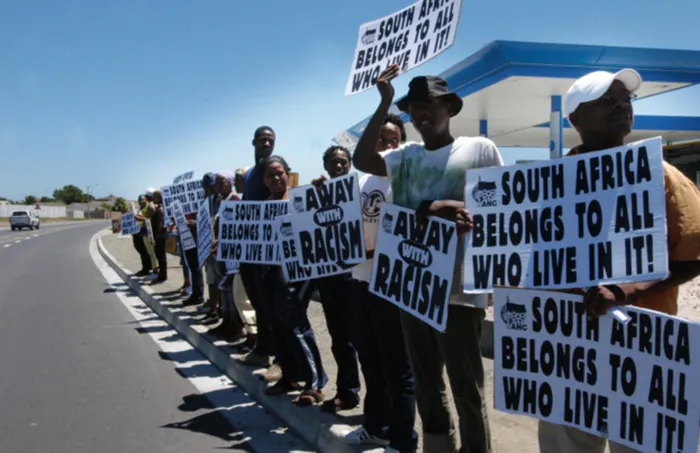Widespread distrust across racial lines: survey

Anti-racism work tends to focus either on socialisation "dialogues" or on educational efforts and is concentrated in only a handful of under-resourced organisations, says the writer. Picture: Denzil Margele Anti-racism work tends to focus either on socialisation "dialogues" or on educational efforts and is concentrated in only a handful of under-resourced organisations, says the writer. Picture: Denzil Margele
Cape Town - Two out of three South Africans do not trust others across racial lines, as citizens appear to interact only in legislated shared spaces like at work, education institutions and shops.
And 61.4% believe reconciliation is impossible if those disadvantaged under apartheid remained poor – although 31.2% of whites disagree with this view, compared to only 11.3% of blacks, 8.4% of Indians and 20.3% of coloureds.
This emerged from the latest SA Reconciliation Barometer 2015, released by the Institute for Justice and Reconciliation (IJR) on Tuesday.
The findings are based on 2 219 interviews conducted in August and September with South Africans representative of the country’s 35 million-strong adult population.
The survey has run since 2003 as part of a broader social research, but this year the SA Reconciliation Barometer was run as a stand-alone.
The findings sketched a complex dynamic of race, class and income inequalities, which impact social relations. It identified economic inequality as the leading source for social divisions (30.3%), followed by race (23.5%) and political parties (20.9%).
IJR policy and analysis head, Jan Hofmeyr, said race recently moved up to second place, after economic inequality, as a source for social division: “The question of race increased in prominence over the past two years as a factor of divisiveness.”
The SA Reconciliation Barometer showed 67.3% of South Africans did not trust, or trusted very little, their fellow South Africans.
But that did not mean they did not want to reach out to others in increased interactions: 58.5% said they wanted more interaction at social gatherings, 69.3% at places of work or study, and 61.4% at home.
While black South Africans had the highest levels of distrust (68.9%), they were also most likely to agree they experienced racism most of the time, particularly if aged between 35 to 44.
Barriers to greater interaction include the continuing apartheid spatial infrastructure, including town planning, transport services and public amenities.
However, economic mobility was an important determinant in levels of interaction: the more South Africans earned, the more likely they were interacting with others from various racial groups.
“Increased interaction does not always equate to increased reconciliation. “Very often it has an initial opposite effect.
“At least interaction creates the space for conversations about reconciliation and broader issues around race,” said Hofmeyr.
“Many South Africans interact in the legislated spaces – shops, study, work – but retreat at the end of the day (into their own social circles).”
The majority of South Africans (61.4%) believe race relations have either stayed the same or deteriorated since the transition from apartheid: 67% of whites believed this, compared with 59.8% of blacks, and 63.1% of Indians and coloureds respectively.
Broken down into provinces, the belief that race relations have stayed the same or worsened since 1994 was most prevalent in the Eastern Cape (78.3%), followed by the Free State and Northern Cape (66.8%), and the Western Cape and KwaZulu-Natal (65.6%). The North West was the most optimistic, with only 42.8% holding this view, while Gauteng was at 54.7%.
The survey found while there was acknowledgement of progress made, 69.7% believed South Africans still needed reconciliation.
When asked about the meaning of reconciliation, creating a more equal society/ redressing injustice emerged as the third most popular meaning – after forgiveness and reducing violence.
And while 71% of South Africans said a united South Africa was desirable, only 64.6% agreed it was possible.